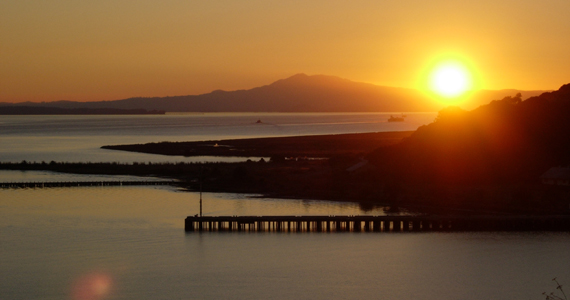The San Francisco Bay is part of the largest estuary on the entire Pacific Coast of the Americas. One of the most biologically productive water bodies in the world, the Bay supports commercial and recreational fisheries, including Chinook salmon, Pacific herring, Bay mussel, and Dungeness crab.

Photo by Joel Williams
By Sejal Choksi
Published: January, 2008
The Bay’s open water habitats, as well as its rocky shorelines and salt marshes, provide critical areas for many species and millions of migratory shorebirds depend on the Bay as a resting spot along the Pacific Flyway.
Since the Cosco Busan oil spill, many people have realized the extent to which a thriving San Francisco Bay defines the character and community of the Bay Area. The burgeoning traffic on the San Francisco Bay, fueled in large part by imports from Asia, has highlighted the economic importance of the Bay as well; in fact, our waterway serves in many ways as an anchor of the State’s $1.3 trillion economy.
Baykeeper was founded in 1989 as a pollution watchdog and Bay advocate working for tough regulations to protect the Bay from oil spills and other kinds of pollution. Baykeeper has an active on-the-water patrol program, and this enables our staff and team of volunteer skippers to be on the Bay patrolling for pollution and documenting and reporting impacts of events like the recent oil spill.
Over the last month, we’ve worked long hours on the spill, but our regular work is focused on keeping sewage, industrial chemicals and polluted urban runoff out of the Bay. These less visible sources cause a daily influx of pathogens, oil and other toxic chemicals that stress Bay Area wildlife and fisheries.
San Francisco Baykeeper has brought about many significant victories for the San Francisco Bay over the years. We have sued cities, including Richmond, Vallejo and Burlingame, for crumbling infrastructure resulting in hundreds of millions of gallons of raw sewage overflowing into streets, creeks and the Bay. We have sued government agencies for failing to regulate pesticides as a pollutant and to control pesticide pollution from farms and irrigation canals. Baykeeper has also won significant improvements for mercury cleanup plans in San Francisco Bay, which will make our Bay fish safe to eat again. In addition, our lawsuits against industrial polluters for illegally discharging heavy metals and toxic chemicals into the Bay have not only stopped polluted runoff but have also generated hundreds of thousands of dollars in funds to nonprofits working on restoration efforts around the Bay.
We hope you’ll consider joining Baykeeper’s efforts to improve the effectiveness of local governments and companies in performing their duties under the Clean Water Act.
How to Get Involved
Get involved in defending the San Francisco Bay from pollution. You can help by making a donation to Baykeeper, volunteering your time in the office or out in the field, or reporting pollution problems in your neighborhood.
Annual memberships start at $15. Baykeeper is the most effective and efficient group out there defending the Bay. Your membership will keep our boat on patrol and our staff in the courtrooms and in front of officials. For every dollar we spend, we’re proud to secure twice that amount in donated services from attorneys, scientists and experts. And every legal victory adds up to hundreds of thousands of dollars every year that go directly to nonprofits for Bay restoration and education efforts.
Become a Member: Call 415-856-0444 x 104, email lola@baykeeper.org, send a check to Baykeeper, 785 Market. St. STE 850, San Francisco, CA 94103, or donate online at www.baykeeper.org.
Volunteer: Email volunteer@baykeeper.org to let us know how you would like to help.
Report Pollution: Call 1-800-KEEP-BAY
Sejal Choksi, San Francisco Baykeeper and Program Director
Sejal first joined San Francisco Baykeeper as an attorney in September 2002, spearheading San Francisco Baykeeper’s efforts to secure the nation’s first regulations to control agricultural pollution. As the San Francisco Baykeeper, she now directs all aspects of Baykeeper’s advocacy programs, pollution patrols, and legal docket.

